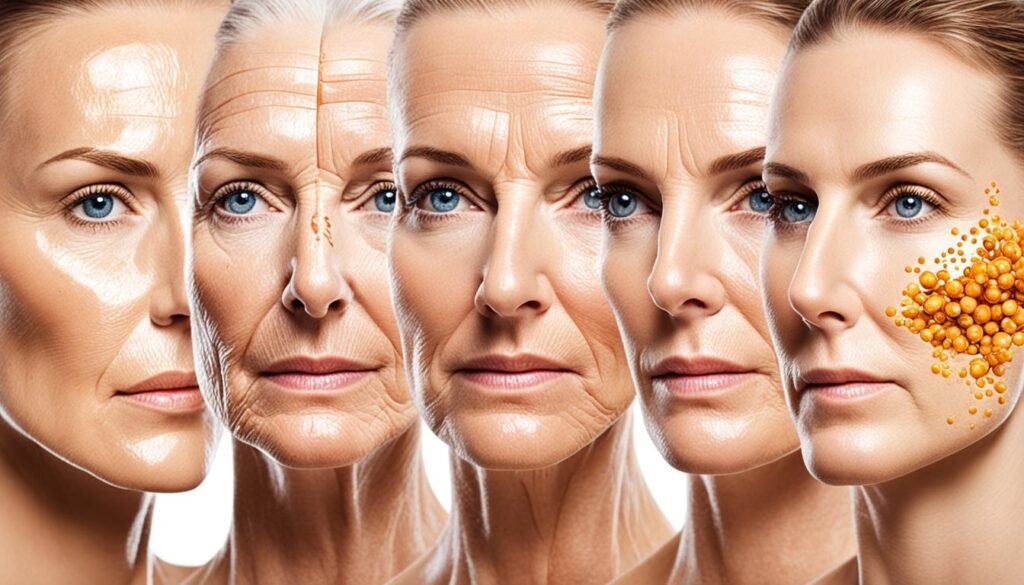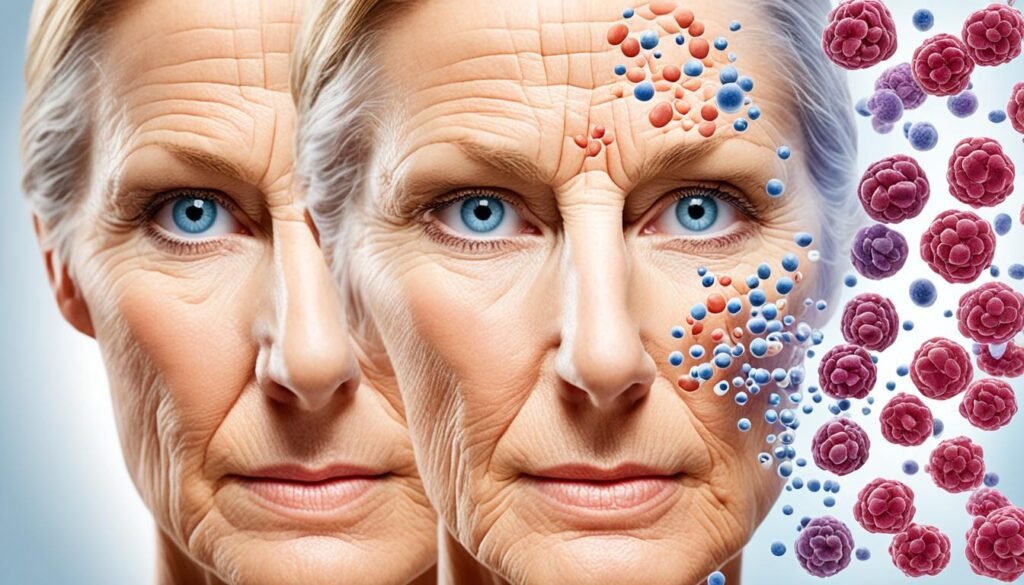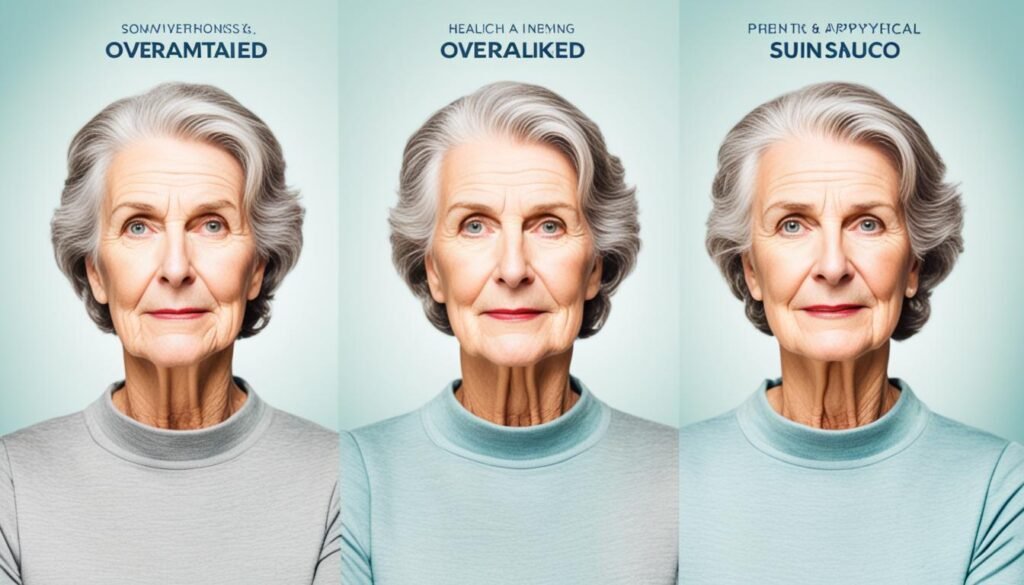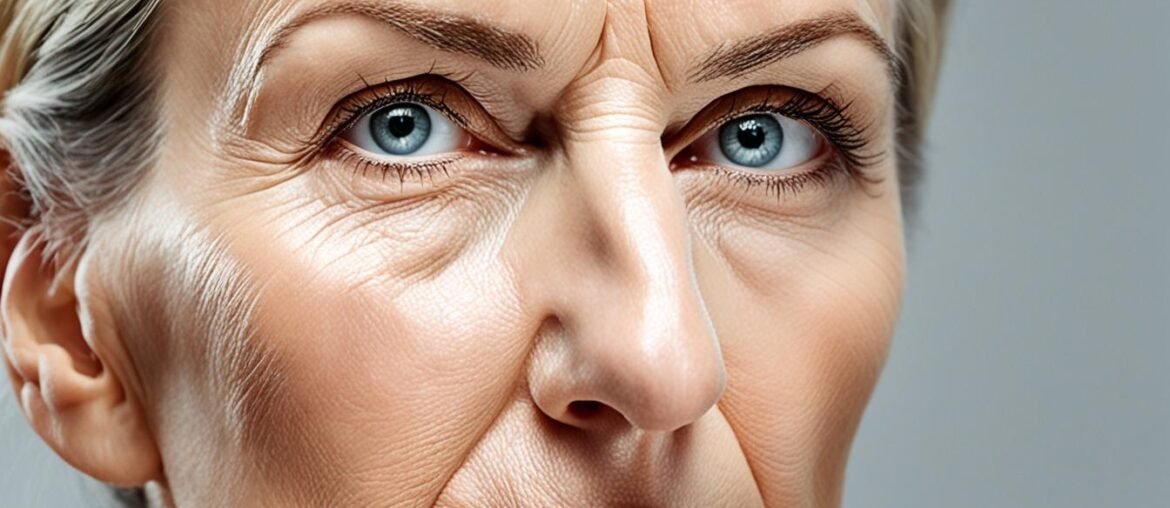Type in why stress is so detrimental to the skin.
Key Takeaways:
- Stress has a significant impact on the aging process of the skin.
- Factors such as stress hormones, oxidative stress, and telomere length can all contribute to stress-induced skin aging.
- Cortisol, a stress hormone, can break down collagen and lead to the formation of wrinkles and sagging skin.
- Oxidative stress can damage cells, proteins, and DNA, resulting in premature aging.
- Chronic stress can lead to shorter telomeres, which are associated with accelerated aging.
The Effects of Stress Hormones on the Skin
When the body is under stress, it releases hormones such as cortisol and adrenaline. These stress hormones can have detrimental effects on the skin, leading to accelerated aging and damage.
Cortisol and Skin Aging:
Cortisol, often referred to as the “stress hormone,” is released by the adrenal glands in response to stress. While cortisol serves an important role in the body’s stress response, prolonged exposure to high levels of cortisol can be harmful to the skin.
Studies have shown that cortisol can break down collagen, a crucial protein that provides structure and elasticity to the skin. Collagen breakdown can result in the formation of wrinkles, sagging skin, and a loss of skin firmness.
Adrenaline and Skin Damage:
Another stress hormone, adrenaline, is released during the body’s fight-or-flight response. Adrenaline can cause vasoconstriction, reducing blood flow to the skin and compromising its health.
Furthermore, adrenaline can contribute to inflammation and oxidative stress, leading to skin damage. This damage can manifest as redness, irritation, and an overall dull complexion.
To further understand the effects of stress hormones on the skin, refer to the table below:
| Hormone | Effects on the Skin |
|---|---|
| Cortisol | – Breaks down collagen – Contributes to the formation of wrinkles and sagging skin – Reduces skin elasticity |
| Adrenaline | – Causes vasoconstriction – Contributes to inflammation and oxidative stress – Damages the skin’s health and appearance |
It’s crucial to manage stress levels and implement stress-reduction techniques to minimize the impact of stress hormones on the skin. Regular exercise, relaxation practices, and self-care can all contribute to a healthier, more resilient complexion.
Oxidative Stress and Skin Aging

Chronic stress can have a significant impact on skin health, leading to a condition known as oxidative stress. This occurs when there is an imbalance between the production of reactive oxygen species (ROS) and the body’s ability to repair the damage caused by these ROS.
Oxidative stress can result in damage to cells, proteins, and DNA, which ultimately leads to premature aging of the skin. The accumulation of oxidative damage over time can contribute to the development of fine lines, wrinkles, and other signs of aging.
To counteract the detrimental effects of oxidative stress, it is crucial to incorporate antioxidants into your skincare routine. Antioxidants help neutralize ROS and prevent further damage to the skin. They work by stabilizing free radicals and promoting the repair of damaged cells.
Common antioxidants used in skincare include vitamins C and E, green tea extract, resveratrol, and niacinamide. By including these antioxidants in your skincare products, you can help protect your skin from oxidative stress and maintain its health and vitality.
“The use of antioxidants in skincare has become increasingly popular due to their ability to combat oxidative stress and protect the skin from premature aging.”
The Benefits of Antioxidants in Skincare
Antioxidants play a crucial role in promoting skin health and combating the signs of aging. Here are some key benefits of incorporating antioxidants into your skincare routine:
- Neutralizing Free Radicals: Antioxidants help neutralize free radicals, which are unstable molecules that can cause cellular damage. By stabilizing free radicals, antioxidants protect the skin from oxidative stress and prevent premature aging.
- Enhancing Collagen Production: Some antioxidants, such as vitamin C, stimulate collagen production in the skin. Collagen is a protein that provides structure and elasticity, giving the skin a smooth and youthful appearance.
- Reducing Inflammation: Oxidative stress can lead to inflammation in the skin, resulting in redness, irritation, and other skin conditions. Antioxidants have anti-inflammatory properties that help calm the skin and reduce inflammation.
- Brightening the Complexion: By neutralizing free radicals and promoting cell turnover, antioxidants can help brighten the complexion and improve the overall appearance of the skin.
By incorporating a variety of antioxidants into your skincare routine, you can provide your skin with the necessary protection against oxidative stress and support its natural rejuvenation processes.
Antioxidant-Rich Foods for Skin Health
In addition to using antioxidant-rich skincare products, including foods that are high in antioxidants in your diet can also benefit your skin. Here are some examples of antioxidant-rich foods:
| Food | Antioxidants |
|---|---|
| Berries (blueberries, strawberries, raspberries) | Anthocyanins, vitamin C |
| Dark chocolate | Flavonoids, catechins |
| Leafy greens (spinach, kale, swiss chard) | Vitamin C, vitamin E, beta-carotene |
| Nuts (almonds, walnuts) | Vitamin E, selenium |
| Green tea | Epigallocatechin gallate (EGCG), catechins |
| Oranges | Vitamin C, flavonoids |
By incorporating these antioxidant-rich foods into your diet, you can support your skin’s health from the inside out and enhance the benefits of your skincare routine.
Telomeres and the Aging Process
Telomeres, the protective caps on the end of chromosomes, play a critical role in the aging process. As cells divide, telomeres naturally shorten. When telomeres become too short, cells can no longer divide, leading to cellular senescence and aging.
Chronic stress has been associated with accelerated telomere shortening, which can contribute to premature aging of the skin. The effects of stress on telomeres are influenced by various factors, including oxidative stress and inflammation caused by stress hormones.
However, research suggests that the effects of stress on telomeres may not be permanent. When stress is reduced and individuals adopt a healthier lifestyle, telomeres can regain their normal length, potentially reversing some of the effects of stress-induced aging.
To visualize the impact of stress on telomere length and biological age, refer to the table below:
| Patient | Telomere Length (bp) | Biological Age (years) |
|---|---|---|
| John | 6,500 | 45 |
| Lisa | 5,800 | 51 |
| Michael | 7,200 | 39 |
| Sarah | 5,200 | 53 |
The table above demonstrates the telomere length and corresponding biological age of different patients. It showcases the potential variation in telomere length and biological age, highlighting the impact of telomere shortening on the aging process.
By understanding the role of telomeres in skin aging and the relationship between stress and telomere length, individuals can take proactive steps to manage stress and maintain optimal skin health.
The Role of Inflammation in Stress-Induced Skin Aging

Stress has profound effects on the body, including the skin. One of the key mechanisms through which stress can accelerate skin aging is inflammation. When the body is under stress, it triggers an inflammatory response, leading to increased levels of cytokines, molecules that regulate immune responses.
This inflammation can have detrimental effects on the skin. It can contribute to the breakdown of collagen, a crucial protein that provides structure and elasticity to the skin. Collagen breakdown can result in the formation of wrinkles and sagging skin, making it one of the visible signs of aging.
In addition, stress-induced inflammation can disrupt the skin’s barrier function, leading to increased permeability and water loss. This can result in dryness, irritation, and an impaired ability to protect against environmental aggressors.
To further compound the issue, chronic inflammation can also contribute to the development or exacerbation of skin conditions such as acne and psoriasis. These conditions can further impact the overall health and appearance of the skin.
Managing stress and reducing inflammation are essential steps in preserving the health and youthfulness of the skin. By implementing stress-management techniques, such as mindfulness, exercise, and relaxation, individuals can help mitigate the inflammatory response triggered by stress.
In addition, adopting a skincare routine that includes anti-inflammatory ingredients and practices can provide further support to the skin. Using products rich in antioxidants, such as vitamin C and green tea extract, can help neutralize free radicals and reduce inflammation. Gentle skincare practices, avoiding harsh ingredients or abrasive treatments, can also help maintain the skin’s barrier function and protect against external stressors.
It is important to note that managing stress and reducing inflammation not only benefits the skin but also contributes to overall well-being. By prioritizing self-care and stress reduction, individuals can promote not only healthy skin but also a healthier and more balanced life.
| Effects of Stress-Induced Inflammation on Skin Aging | Skin Conditions Associated with Stress-Induced Inflammation |
|---|---|
| Breakdown of collagen leading to wrinkles and sagging skin | Acne |
| Disruption of the skin’s barrier function, causing increased permeability and water loss | Psoriasis |
| Inhibition of healthy skin cell turnover and regeneration |
The Impact of Stress on Skin Health and Function
Stress can have a significant impact on the health and function of the skin. It can affect various aspects, including the skin barrier function, sebum production, and skin hydration.
When we are under stress, the skin’s barrier function, which is responsible for keeping moisture in and irritants out, may become compromised. This can result in increased water loss and dryness, making the skin more susceptible to damage and inflammation.
Furthermore, stress can stimulate the production of sebum, the skin’s natural oil. Excessive sebum production can clog pores and contribute to the development of acne breakouts. Therefore, managing stress is crucial in maintaining balanced sebum production and preventing skin issues.
The Role of the Skin Barrier Function
The skin barrier function plays a crucial role in maintaining skin health. It acts as a protective barrier, preventing harmful substances from entering the skin and locking in moisture. When stress disrupts the skin barrier function, the skin becomes more vulnerable to environmental aggressors, leading to dryness, sensitivity, and irritation.
The Impact on Sebum Production
Sebum is an essential component of healthy skin, as it helps to moisturize and protect the skin. However, stress can cause the sebaceous glands to produce excess sebum, leading to oily skin and potential acne breakouts. This is because stress triggers the release of certain hormones that can stimulate sebum production. By managing stress levels, we can help regulate sebum production and maintain a clear complexion.
The Importance of Skin Hydration
Proper hydration is vital for maintaining healthy skin. However, stress can disrupt the skin’s natural moisture balance, leading to dehydration and dryness. When the skin lacks hydration, it can appear dull, rough, and more prone to fine lines and wrinkles. By managing stress and adopting a consistent skincare routine that includes moisturization, we can help restore and maintain skin’s natural hydration levels.
Stress can have a significant impact on the skin’s barrier function, sebum production, and hydration. By managing stress levels and implementing a targeted skincare routine, we can support the skin’s health and function, reducing the risk of skin issues and promoting a more vibrant complexion.
The Importance of Lifestyle Factors in Managing Stress and Skin Aging

When it comes to managing stress and preventing premature skin aging, lifestyle factors play a significant role in maintaining overall well-being. A healthy diet, regular exercise, and adequate sleep are all crucial elements that can positively impact both stress levels and skin health.
A balanced diet rich in antioxidants and essential nutrients can help combat oxidative stress, a key factor in skin aging. Antioxidants work to neutralize harmful free radicals and protect the skin from damage. Incorporating foods such as berries, leafy greens, and fatty fish can provide the body with a wide range of antioxidants that promote skin health and youthfulness.
Regular exercise is another important lifestyle factor that can help reduce stress levels and improve overall well-being. Engaging in physical activity stimulates the release of endorphins, also known as “feel-good” hormones, which can help alleviate stress and promote a sense of calm. Whether it’s going for a jog, practicing yoga, or participating in a team sport, finding an exercise routine that suits your preferences can have a positive impact on both your mental and physical well-being.
Additionally, incorporating stress-reducing practices into your daily routine can further support skin health. Mindfulness techniques, such as meditation and deep breathing exercises, have been shown to reduce stress and promote relaxation. These practices help regulate the body’s stress response, leading to improved skin health and a more radiant complexion.
“A balanced lifestyle that incorporates a healthy diet, regular exercise, and stress-reducing practices can have a profound impact on both stress levels and skin health.” – Dr. Emily Thompson, Dermatologist
By prioritizing lifestyle factors such as maintaining a healthy diet, engaging in regular exercise, and incorporating stress-reducing practices, individuals can effectively manage stress and promote healthier skin aging. The key is to create a holistic approach to self-care that nourishes both the body and mind, ultimately leading to a more vibrant and youthful complexion.
The Role of Sleep in Managing Stress and Skin Aging

Getting enough quality sleep is essential for managing stress and promoting skin health. Sleep plays a crucial role in the body’s repair and regeneration processes, including the removal of cellular waste and collagen synthesis. When we consistently lack sufficient sleep, it can have detrimental effects on our skin.
Chronic sleep deprivation can disrupt these vital processes, leading to various skin issues. One of the consequences of sleep deprivation is increased inflammation in the body, which can manifest as redness, swelling, and irritation on the skin. This persistent inflammation contributes to premature aging, as well as exacerbates existing skin conditions such as acne, eczema, and psoriasis.
In addition to inflammation, inadequate sleep can also impede collagen production. Collagen is a protein that gives our skin structure and elasticity, and its production occurs during sleep. When we don’t get enough sleep, collagen synthesis is compromised, resulting in a loss of skin firmness and the development of fine lines and wrinkles.
Furthermore, sleep deprivation disrupts the skin’s natural barrier function, leading to increased water loss and dryness. This can make the skin more susceptible to environmental damage and impair its ability to retain moisture, resulting in a dull and dehydrated complexion.
Prioritizing sleep hygiene is crucial for maintaining optimal skin health and managing stress. Establishing a consistent sleep schedule, creating a conducive sleep environment, and practicing relaxation techniques before bedtime can enhance the quality and duration of our sleep. Taking care of our sleep not only revitalizes our bodies but also rejuvenates our skin.
The Effects of Sleep Deprivation on Skin Health:
| Sleep Deprivation | Effects on Skin |
|---|---|
| Inflammation | Increases skin redness, swelling, and irritation |
| Collagen Production | Decreases collagen synthesis, leading to sagging skin and wrinkles |
| Skin Barrier Function | Compromises the skin’s protective barrier, resulting in increased water loss and dryness |
By prioritizing sufficient and restful sleep, we can effectively manage stress levels and promote healthy, vibrant skin. Incorporate sleep-enhancing practices into your daily routine to harness the power of sleep for overall well-being and skin rejuvenation.
The Impact of Emotions and Mental Well-being on Skin Aging

Emotions and mental well-being play a significant role in the health and aging process of our skin. Chronic stress, negative emotions, and poor mental well-being can have detrimental effects on our skin, contributing to the development of conditions such as acne, eczema, and psoriasis. The mind-body connection is powerful, and our emotional state can manifest physically on our skin.
On the other hand, actively engaging in stress reduction techniques, cultivating positive emotions, and managing our mental health can have a positive impact on our skin health and slow down the aging process. When we take care of our emotional well-being, it reflects in healthier-looking skin.
Remember, the mind and skin are interconnected. When you’re stressed, your skin will show it. Try incorporating stress reduction techniques into your daily routine to promote a healthier complexion.
– Dr. Mia Johnson, Dermatologist
The Benefits of Stress Reduction Techniques
1. Meditation: Regular meditation practice can help calm the mind and reduce stress levels. Deep breathing exercises during meditation promote relaxation and decrease the production of stress hormones, ultimately benefiting skin health.
2. Relaxation exercises: Techniques such as progressive muscle relaxation, guided imagery, and aromatherapy can relax the body and mind, alleviating stress and its impact on the skin.
3. Engaging in hobbies: Taking time for activities you enjoy can bring joy, spark creativity, and reduce stress levels. Whether it’s painting, gardening, or playing a musical instrument, engaging in hobbies can have a positive impact on your mental well-being and, in turn, your skin health.
The Importance of Emotional Well-being for Skin Health
Our emotional well-being affects our skin in various ways:
- Better skin barrier function: Positive emotions and reduced stress levels can help support the skin’s barrier function, enhancing its ability to retain moisture and protect against irritants.
- Increased skin hydration: Managing stress and promoting emotional well-being can help regulate sebum production, resulting in better skin hydration and a reduction in dryness.
- Reduced inflammation: Positive emotions and stress reduction techniques can help decrease inflammation in the body, leading to a calmer complexion and fewer skin issues.
By prioritizing stress reduction techniques and emotional well-being, you can nurture not only a healthier mind but also healthier-looking skin.
Conclusion
After examining the effects of stress on skin aging, it is clear that chronic stress can have detrimental consequences on our skin health. Factors such as inflammation, oxidative stress, telomere shortening, and barrier function disruption can all contribute to accelerated aging and the development of skin conditions. However, the good news is that we have the power to manage stress and promote healthy skin.
By implementing stress management techniques and prioritizing self-care, we can mitigate the negative impact of stress on our skin. This includes adopting a healthy lifestyle that incorporates balanced nutrition, regular exercise, and adequate sleep. These lifestyle factors help combat oxidative stress, reduce inflammation, and support the body’s natural rejuvenation processes.
Additionally, incorporating stress reduction techniques into our daily routine can help promote emotional well-being and positively impact our skin health. Practices such as meditation, relaxation exercises, and engaging in hobbies can all contribute to managing stress and maintaining a healthy, youthful appearance.
In conclusion, managing stress is crucial for maintaining healthy skin and delaying the signs of aging. By taking proactive steps to reduce stress levels and prioritize self-care, individuals can promote healthier, more radiant skin as they age. Remember, a balanced mind leads to balanced skin.
FAQ
Can stress cause rapid skin aging?
Yes, stress has been found to have a significant impact on the aging process of the skin. Exposure to stress can lead to inflammation and damage to DNA and cells, resulting in accelerated skin aging.
How does stress hormones affect the skin?
When the body is under stress, it releases hormones such as cortisol and adrenaline. These hormones can cause inflammation and damage to the skin, leading to accelerated aging. Cortisol, in particular, has been found to break down collagen, a vital protein in the skin that provides structure and elasticity.
What is the role of oxidative stress in skin aging?
Chronic stress can lead to oxidative stress, which is an imbalance between the production of reactive oxygen species (ROS) and the body’s ability to repair the damage caused by these ROS. Oxidative stress can damage cells, proteins, and DNA, leading to premature aging. Antioxidants, which help to neutralize ROS, play a crucial role in maintaining skin health and preventing oxidative damage.
How do telomeres contribute to the aging process?
Telomeres, which are protective caps on the end of chromosomes, play a crucial role in the aging process. Chronic stress has been associated with shorter telomeres, which can contribute to premature aging. However, the effects of stress on telomeres can be reversible, and when stress is reduced, telomeres can regain their normal length.
What is the impact of inflammation on stress-induced skin aging?
Stress can trigger an inflammatory response in the body, leading to increased levels of cytokines, molecules that regulate immune responses. This inflammation can contribute to the breakdown of collagen, disruption of the skin’s barrier function, and the development of skin conditions such as acne and psoriasis. Managing stress and reducing inflammation can help preserve the skin’s health and prevent premature aging.
How does stress affect skin health and function?
Stress can affect the skin’s barrier function, which helps to keep moisture in and irritants out. When under stress, the skin barrier may be compromised, leading to increased water loss and dryness. Additionally, stress can stimulate the production of sebum, the skin’s natural oil, which can contribute to acne breakouts. Managing stress and maintaining a healthy skincare routine can help support the skin’s barrier function and prevent skin issues.
What is the importance of lifestyle factors in managing stress and skin aging?
Lifestyle factors such as a healthy diet, regular exercise, and adequate sleep play a crucial role in managing stress and preventing premature skin aging. A balanced diet rich in antioxidants and nutrients can help combat oxidative stress, while regular physical activity can reduce stress levels and promote overall well-being. Incorporating stress-reducing practices such as mindfulness and relaxation techniques can also positively impact skin health.
How does sleep impact stress and skin aging?
Getting enough quality sleep is essential for managing stress and promoting skin health. Chronic sleep deprivation can disrupt the body’s repair and regeneration processes, leading to increased inflammation, decreased collagen production, and impaired skin function. Prioritizing sleep hygiene can help support the body’s natural rejuvenation processes and promote healthy, youthful-looking skin.
What is the impact of emotions and mental well-being on skin aging?
Emotions and mental well-being can have a significant impact on skin health and aging. Chronic stress, negative emotions, and poor mental well-being can contribute to skin conditions such as acne, eczema, and psoriasis. Conversely, practicing stress reduction techniques, cultivating positive emotions, and managing mental health can help promote skin health and delay the aging process.
How can managing stress promote healthier skin?
By taking steps to manage stress, individuals can promote healthier, more radiant skin as they age. Implementing stress management techniques, maintaining a healthy lifestyle, and prioritizing self-care can help support skin health and delay the signs of aging.




